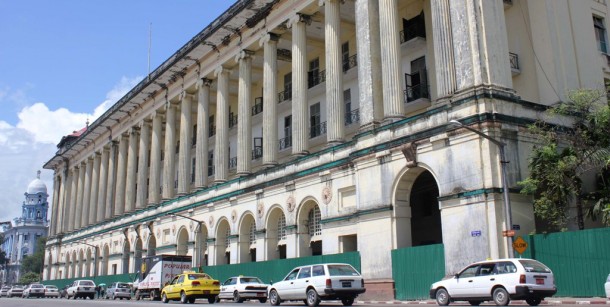RANGOON — A group of Burmese lawyers has threatened to sue the government for leasing the building that formerly housed the Rangoon Division Court to a private company.
More than 50 lawyers protested on Wednesday outside the building on downtown Rangoon’s Strand Road, which is currently being converted into a hotel by a little-known company.
“We staged a protest because we object to the government’s plan to lease the building to a private company,” said Kyee Myint, a member of Myanmar Lawyers’ Network.
“If our protest will not bring any result, we will sue the Myanmar Investment Commission, which granted the lease.”
The 90-year-old building—in a prime location in Rangoon’s colonial downtown—was shuttered in 2012 and handed for development to a purportedly Burmese-owned firm named “Flying Tiger Company.”
The owner of the company is unknown and no details have been made public about the lease or the plans for the property. Officials at the Myanmar Investment Commission were not unavailable for comment.
“Our ultimate goal is to restore the original status of the building—the Divisional Court. What they are doing now shows total disregard for a court that was still functioning until it was shut down,” Kyee Myint added.
“If we haven’t got any reply, we will start our lawsuit in June.”
Kyee Myint explained that the protest was a follow-up to one they held two years ago, when the government announced the handover of the building, along with the 103-year-old High Court building, which was to be turned into a hotel.
After the protest, the government ordered the High Court project abandoned, but work on the Divisional Court building went ahead.
Both buildings are on Rangoon’s Heritage List and have long played important roles in the country’s judiciary system.
However, when the former military regime moved the capital to Naypyidaw in 2005, the High Court was downgraded to the Rangoon Divisional High Court.
The colonial-era Divisional Court building was originally the Police Commissioner’s Office. The structure, fronted with large columns, stretches a whole city block along Strand Road. In more recent years, it contained local courts and judges’ offices.
Aye Min, another lawyer, said the Myanmar Lawyers Network will in its lawsuit cite a 1988 preservation law that carries a five-year prison term for anyone who makes structural changes to landmark buildings, as a legal means to nullify the sale of the buildings.

















